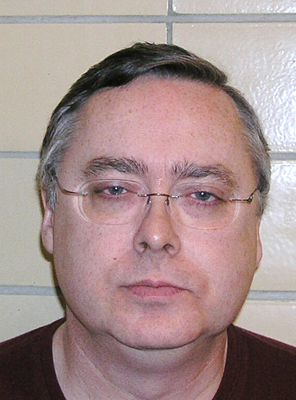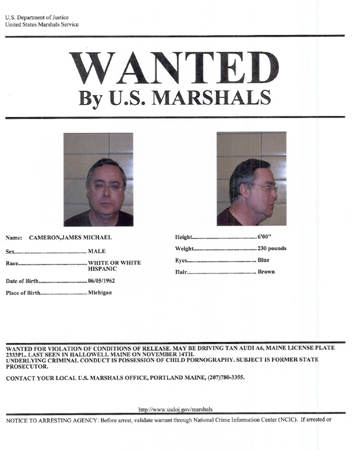Hours after learning that his appeal of his child pornography convictions had failed and he would likely go back to prison, Maine’s former top drug prosecutor cut off his electronic monitoring bracelet and fled.
James Cameron, 50, was being hunted Monday by the U.S. Marshals Service and law enforcement nationwide, authorities said.
The electronic monitoring device was a condition of Cameron’s release pending his appeal of his conviction in August 2010 on 13 federal charges of transportation, receipt and possession of child pornography.
Marshals said Cameron fled early Thursday morning, hours after the U.S. 1st Circuit Court of Appeals in Boston upheld seven of the 13 convictions and gave the government room to re-try Cameron on the other six charges.
Cameron had 15 years remaining on his original 16-year sentence.
He was last seen in Hallowell, where he lived before moving to Rome, driving a tan 1999 Audi A6, license plate 2333PL, according to marshals. That car, which he owns, is missing.
“We don’t know where he is, but we’re following up on leads anywhere and everywhere,” said Deputy Dean Knightly, who oversees the District of Maine for the Marshals Service.
Knightly said Cameron didn’t leave a note and there is no indication he has harmed himself. Marshals have not heard of Cameron contacting anyone since he fled, Knightly said.
Cameron visited his ex-wife, Barbara Cameron, and their 17-year-old son Wednesday afternoon in Hallowell, shortly after learning of the court’s decision, according to a declaration filed in U.S. District Court in Bangor seeking revocation of Cameron’s bail.
Barbara Cameron said her ex-husband was “not doing well” and told their son he was going back to prison, U.S. Probation Officer Mitchell Oswald wrote in the declaration.
Knightly said Barbara Cameron has been interviewed and said she doesn’t know where her ex-husband went.
The monitoring bracelet indicates that Cameron returned to his home in Rome at 8 p.m. Wednesday. Knightly said someone, whom he wouldn’t identify, saw Cameron in Rome that night.
At 12:46 a.m. Thursday, the bracelet showed that he left his home without authorization. An hour later, responding to what he described as a missed call from the monitoring device, Oswald called Cameron’s home number and his cellphone, and got no response.
Oswald tried to call Cameron again between 7 and 8 a.m., and again could not reach him.
Probation officers and Maine State Police went to Cameron’s home around 10:30 a.m. Thursday. Knightly said he found out at noon that Cameron was gone.
“Mr. Cameron and his vehicle were both gone,” Oswald wrote. “His cellphone was in the house. The laptop computer that Pretrial Services monitored as a condition of release was also gone.”
U.S. District Court Chief Judge John A. Woodcock Jr. issued a warrant for Cameron’s arrest that day.
From the time Cameron disappeared Thursday until the Marshals Service made it public Monday, the agency followed up on leads, Knightly said.
“We immediately began looking into possible locations and whereabouts once we were notified he was missing,” he said.
The Marshals Service said it is hunting for Cameron along with the Maine Violent Offender Task Force and local, county and state police.
Cameron was the chief drug crimes prosecutor in the Maine Attorney General’s Office, where he spent 18 years as an assistant attorney general.
He came under investigation after the National Center for Missing and Exploited Children reported that Yahoo! had found multiple images of child pornography in a Yahoo! account belonging to Cameron’s wife.
He was fired from the Attorney General’s Office in April 2008 and indicted on child pornography charges on Feb. 11, 2009.
On Aug. 23, 2010, after a six-day, non-jury trial in federal court in Portland, Cameron was convicted of 13 offenses committed in 2006 and 2007.
Woodcock, who presided over the trial, sentenced Cameron to 16 years in prison on March 11, 2011.
Five months later, with the convictions under appeal, the 1st Circuit Court ruled that Cameron could be free on bail while his appeal was pending.
In its ruling, the court suggested that a change in law generated “exceptional reasons why (Cameron’s) detention would not be appropriate.”
Under the conditions of his release, Cameron was ordered to submit to GPS monitoring, register with “all pertinent sex offender registries,” report to a probation officer, post an unsecured $75,000 bond, adhere to a curfew set by a supervising officer, and participate in Internet monitoring.
Michael A. Cunniff, Cameron’s attorney during the trial, said Monday that he could not comment on his former client’s disappearance.
Part of Cameron’s appeal focused on the admissibility of evidence.
In an opinion released Wednesday by Circuit Judge Juan Torruella, the three-judge appeals panel ruled that the indictment was sufficient, the trial venue in Maine was proper and Yahoo!’s searches of Cameron’s accounts for child pornography did not violate the Fourth Amendment, so a suppression motion was properly denied.
The appeals court also said it concluded “that the district court did not err in admitting evidence from Yahoo! or the Google Hello Connection Logs.”
However, the court said, Cameron should have had an opportunity to cross-examine Yahoo! employees who prepared the child pornography reports. It said that allowing the reports to be admitted “violated Cameron’s rights under the confrontation clause” and in turn tainted the CyberTipline Reports.
The case was sent back to U.S. District Court in Maine for resentencing. Assistant U.S. Attorney Don Clark said no decision had been made about whether to pursue a new trial.
Kennebec Journal Staff Writer Craig Crosby can be contacted at 621-5642 or at:
ccrosby@mainetoday.com
Kennebec Journal Staff Writer Michael Shepherd can be contacted at 621-5632 or at:
mshepherd@mainetoday.com
Send questions/comments to the editors.




Comments are no longer available on this story